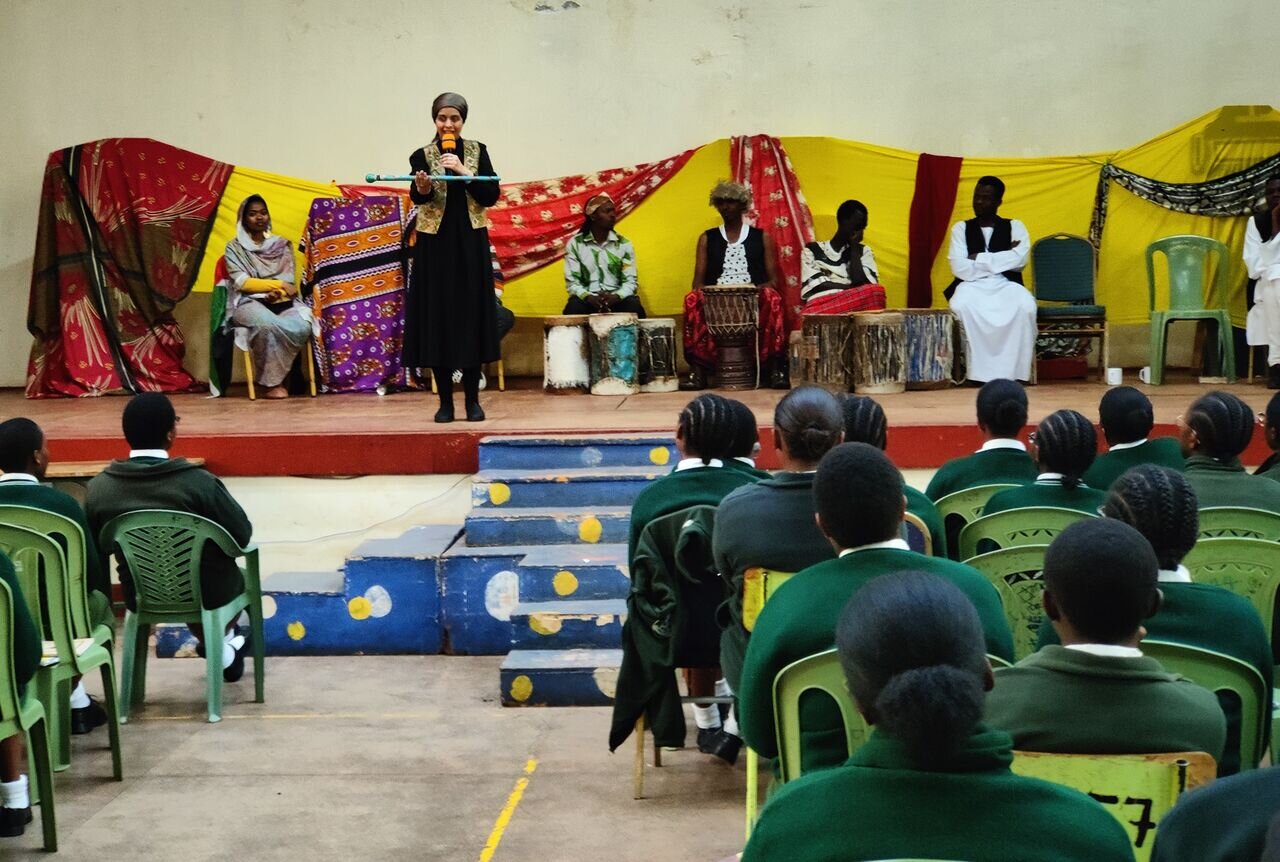Iranian storyteller Bahareh Jahandoost performs naqqali sessions in Kenya

TEHRAN – Acclaimed Iranian naqqal Bahareh Jahandoost participated in the 15th International Sigana International Storytelling Festival, which was held in Kenya from June 1 to 8, and performed narratives from Ferdowsi’s Shahnameh (Book of Kings).
The international storyteller and narrator, Jahandoost attended the event as a special guest and performed in the festival’s opening ceremony as well as its main events, IRNA reported.
Her performances at Kenyan schools and cultural centers, including the prestigious Alliance High School, under the auspices of the United Nations, were warmly received by audiences.
Jahandoost also appeared live on Kenya's national broadcaster KBC's morning program “Good Morning Kenya,” where she performed two storytelling sessions in English during a 30-minute interview.
She also gave a special performance for Persian-speaking Iranians and Afghans at an Eid al-Adha celebration organized by the Cultural Attaché Office of the Embassy of the Islamic Republic of Iran in Kenya.
Reflecting on her experience at the festival, Jahandoost said: “The biggest difference I noticed between Iranian and Kenyan storytelling is in the content. Their stories are often very simple, even their myths and traditional tales. I don’t mean this as a criticism; it’s simply a characteristic. Most of their stories are nature-based: tales of animals, talking trees, or magical flowers. This closeness to nature was intriguing, but their narratives had very linear and basic structures”.
“In Iran, even our children's stories draw on literature that’s rich and layered, such as simplified versions of “Shahnameh,” or works by Saadi and Rumi. Iranian stories contain hidden layers that even adults can appreciate. I saw less of this depth in the festival’s stories. This experience deepened my appreciation for Iran’s vast and profound storytelling heritage,” she added.
Despite these differences, she emphasized the cultural significance of storytelling in African traditions: “Even under challenging economic and social conditions, storytellers are highly valued in Kenya. The festival's opening ceremony lasted five and a half hours, and the children listened with full enthusiasm until the very end — it was astonishing to see how captivated they were by the stories. This made me question why, despite our deeper storytelling heritage, storytelling doesn’t have the same standing in Iran,” she noted.
“For the opening ceremony, I chose the story of ‘Zal and the Simurgh,’ narrating the birth of a child with unusual hair and skin color who is cast away but eventually finds value through wisdom, not appearance or race,” Jahandoust said. “This was an important message for the children of Kenya”.
Her second performance was “The Battle of Rustam and Akvan Div,” which she described as a more fantastical piece featuring non-human characters.
“I wanted a more imaginative setting and aimed to make it more child-friendly, aligned with the audience’s taste. The children were eager to engage; they mimicked movements, called out, searched for characters, and even helped decide Rustam’s actions. It became an interactive performance and was warmly received,” she explained.
In the TV interview on “Good Morning Kenya,” Jahandoost spoke about the Shahnameh’s message, a humanistic, peace-seeking vision beyond borders, grounded in wisdom. She introduced naqqali as a cultural treasure and a registered intangible heritage by UNESCO.
“The host asked a striking question: ‘In today’s world of social media, where speed and superficiality dominate, how can we preserve ancient stories?’ I said that in my view, stories are powerful enough on their own; we just need to present them properly. Our greatest task is to maintain the traditional structure of naqqali while presenting it in a modern, relevant way that today’s audience can connect with,” she asserted.
Naqqali, or Persian epic storytelling, is the oldest form of narrating tales in Iran and has long played a significant role in society. A naqqal is a storyteller who recites epic tales, primarily revolving around the stories of Iranian mythological kings and heroes.
Bahareh Jahandoost, 40, has been involved in theater since she was seven years old, and she trained with the renowned Iranian naqqal, Morshed Vali-Allah Torabi. Using the traditional form of narrating stories through naqqali performance, she has performed in China, France, Hungary, India, Italy, Russia, and Turkey.
The Sigana Festival, launched in 2009 and now held biennially, is one of Kenya’s major cultural events. It celebrates traditional storytelling. The word “Sigana” refers to a style of African storytelling accompanied by music and song, which bears a resemblance to Iranian naqqali, both using exaggerated gestures and performative narration.
Photo: Bahareh Jahandoost performs during the 15th International Sigana International Storytelling Festival, held from June 1 to 8 in Kenya.
SS/SAB
Leave a Comment